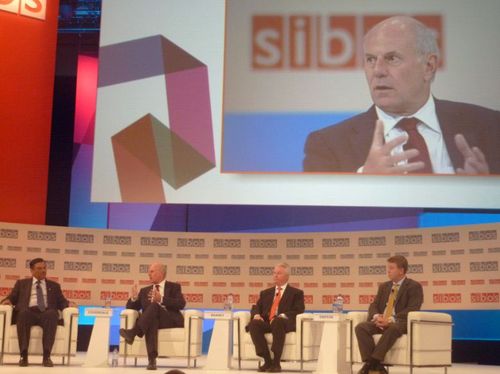
Just before lunch, I then sat through the second big plenary keynote debate: Where’s the growth in 2012 and beyond? with
- John E Coverdale, Group General Manager, Head of Global Transaction Banking, HSBC Holdings plc
- Tim Keaney, Vice Chairman & CEO Asset Servicing, BNY Mellon
- M.D. Mallya, Chairman, Indian Banks' Association & Chairman & Managing Director, Bank of Baroda
- Paul Simpson, Head of Global Transaction Services, Bank of America Merrill Lynch
Moderated by Mary Thompson, Journalist with CNBC.

Lots of good commentary here, and quite a few notable quotes.
I won’t log the whole session, but here’s a few words and ideas I liked:
Tim Keaney (when asked if there’s any growth today): “It doesn’t mean there’s no growth, just that our shareholders are used to double digit growth in the past.”
He went on to talk about various aspects of how things have changed, and I loved his comment that “in a post-Madoff environment, asset servicing needs to check that the assets actually exist”. Didn’t they do this before?
John Coverdale saw growth being easier in emerging markets as “they’re not dealing with legacy systems, in terms of regulations and infrastructure. Whilst, in our developed markets, we are dealing with innovation and a digital revolution.”
Tim Keaney was good value, and said that he was concerned with “the unevenness of regulation. Look at what Dodd-Frank is doing and the position in Europe versus America, and it’s also the sheer amount of regulation. Well intended regulation should build confidence in the system and encourage people to come back into the markets. I’m not convinced the myriad of regulation is going to achieve that goal, or help the market in rebuilding confidence”.
John Coverdale made clear that the cost of regulations will be “passed on to the customer, as we work for our shareholders … we are here to provide a service to our customers, not to rip them off however. So we need a sensible dialogue about how to achieve this”.
I sent a question to the panel via twitter about whether regulatory arbitrage would increase as a result of the dichotomy of USA and EU approaches.
Tim Keaney said: “Absolutely there will be regulatory arbitrage, because capital and companies can move; and it’s not just regulatory arbitrage but tax arbitrage”.
John Coverdale agreed, and said that: “shareholders will demand it and we have to respond to what the shareholders will want”.
Paul Simpson felt that “arbitrage is not the right word. It’s maximising shareholder value for your institution”.
I agreed and anticipated this response, but was hugely disappointed in many ways that they saw this as so obviously the right move.
In terms of where future growth will come from, M.D. Mallya, Chairman, Indian Banks' Association & Chairman & Managing Director, Bank of Baroda “sees growth in Africa and we have significant presence there. The next growth opportunity is the African subcontinent.”
John Coverdale agrees “about Africa, but also Latin America. These are not necessarily new trade flows as a Chinese client heard Cantonese being spoken in Lagos the other day, and discovered it was two Indian gentlemen who thought that Cantonese was the only way to be understood.”
Mary then asked about the delay in the implementation of Target2 for Securities (T2S) announced here yesterday by the ECB.
Tim Keaney said he was disappointed. “Trying to explain to a customer why custody is a lot more expensive in Europe doesn’t make sense to a pension fund in mid America. I was hopeful therefore about T2S being a change that will create one cash movement backbone. There’s then tax and securities harmonisation and, when you combine all those things, you can drop the costs of equities trades that, right now, has up to six times cost differentials compared to the USA.”
John Coverdale added an insightful note that: “If we know what the end game is, we can be more positive in moving towards it, rather than the bickering around the edges of it and what idiosyncrasies each country has in that context.”
He then added later that the Eurozone issue is an issue of confidence. “It goes back to confidence again. We’ve lost the confidence of people in banks and the Eurozone has gone the same way. Dollar liquidity is now the issue and we have to unblock that. One way it could go is to be totally isolationist and the EU trades with the EU, and the US with the US. Alternatively we can look to RMB as another source. We don’t want this and so it means that governments must stop playing party politics and sort these things out.”
Tim Keaney added that “capital will flow to confident currencies and strong economies. When there’s a shock to the system – whether economic or political – people move their money, and that’s good for us.”
An interesting session, and one that had a large number of quotable quotes, as you can see.
But the main one for me is that if growth will come through regulatory arbitrage, what hope is there for the regulators?
Chris M Skinner
Chris Skinner is best known as an independent commentator on the financial markets through his blog, TheFinanser.com, as author of the bestselling book Digital Bank, and Chair of the European networking forum the Financial Services Club. He has been voted one of the most influential people in banking by The Financial Brand (as well as one of the best blogs), a FinTech Titan (Next Bank), one of the Fintech Leaders you need to follow (City AM, Deluxe and Jax Finance), as well as one of the Top 40 most influential people in financial technology by the Wall Street Journal's Financial News. To learn more click here...




















